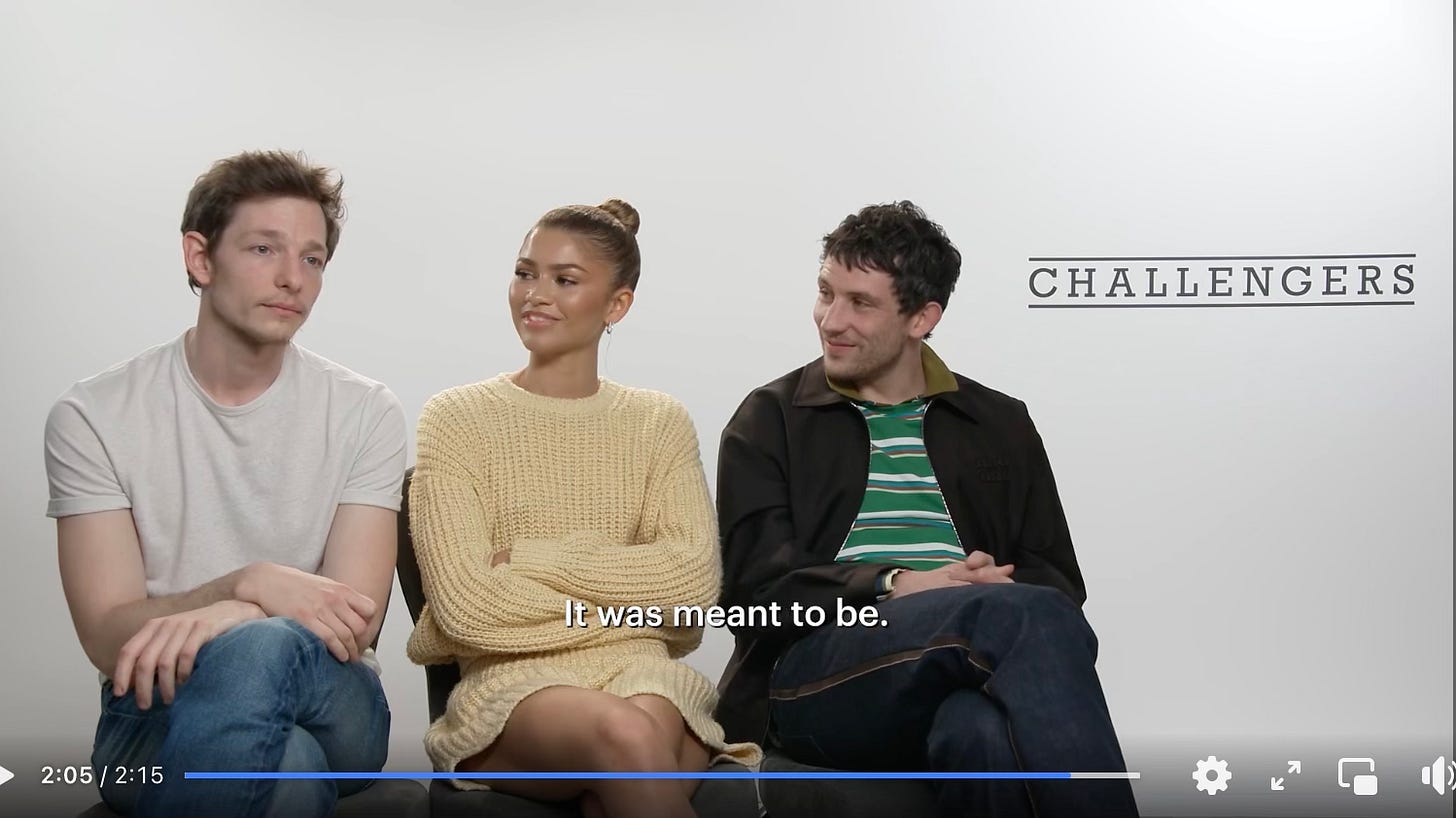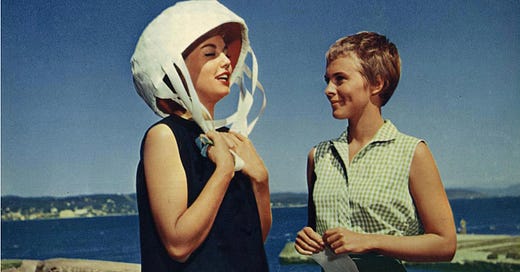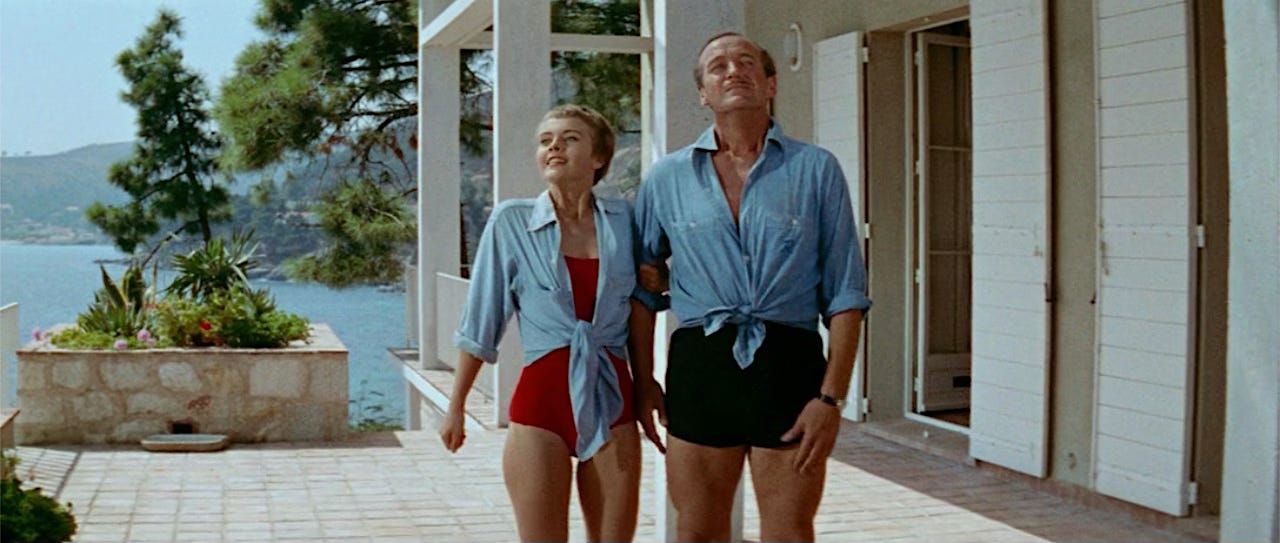Bonjour Tristesse, Françoise Sagan [Film | Book]
Challengers, Justin Kuritzkes [MGM]
Otto Preminger’s 1958 “Bonjour Tristesse” was his second film with Jean Seberg. It’s a frothy vacation escape about a curious triangle between a 17-year-old girl, her father, and his lover (who is also the best friend of her departed mother.)
It is based on Françoise Sagan’s novel and currently streaming as part of Criterion’s showcase of Columbia Pictures in the 1950s.
Most writing about the film mentions it was not well-received upon release. The NYT called it “somewhat astonishing, but thin.” Variety panned the film as “not a Class A effort.”
It’s been reevaluated as a classic which launched Seberg and created a visual template that has been borrowed from ever since. Lynn Yager suggested in 2013 you pattern yourself on the lead actresses who are “traipsing around in wardrobes that provoke the most intense envy, fifty-odd years on.”
Preminger shot the film in Cinemascope, and cast two exceptional actors: David Niven and Deborah Kerr alongside the still relatively unknown Seberg.
Father and daughter rent a villa on the Côte d’Azur and waltz around with their lovers while wearing matching blue chambray shirts monogrammed with Raymond’s “R.”
When Ann (Deborah Kerr) arrives as Raymond’s new love interest, she gently insists that everyone act their age. Fine for Raymond, who is aging out of the fun part of being a playboy, but startling to Cecile, who immediately foments a plot to remove Ann from their lives.
The source material was Sagan’s first novel, published when she was 19. Rachel Cusk considered the novel in a 2019 essay:
Cécile, a motherless seventeen-year-old whose permissive, feckless father has provided the only yardstick for her personal conduct, offers Sagan a particularly naked example of the human sensibility taking shape. Cécile’s encounters with questions of right and wrong, and with the way those questions cut across her physical and emotional desires, constitute an interrogation of morality that is difficult to credit as the work of an eighteen-year-old author.
Bonjour Tristesse is being remade by Durga Chew-Bose, who is both writing and directing. Chloë Sevigny is taking on the Deborah Kerr role (impossible shoes to fill; Sevigny is the only actor I could imagine trying).
Chew Bose told Deadline:
I’ve always loved summer movies—their consideration of darkness, or women seeking shade, or women in hats, and how necessary it becomes to stay cool (even with one’s feelings).
—
Like everyone disappointed with Denis Villeneuve’s underuse of Zendaya in Dune Part Two, I could not wait for Challengers, which is now available on streaming.
Zendaya plays Tashi Duncan: a delightfully selfish tennis phenom who sets up two friends in an endless match for her attention. Tashi gives us good clean tennis and plenty of pre- and post-coitial tension.
“I left the theatre feeling like I understood every decision each character made, because they were so well written and well acted and well directed,”
told . Exactly!The writer is Justin Kuritzkes, husband of Celine Song (“Past Lives”). In case you have missed it, everyone wants to set up their respective debut films as two versions of a threesome they must be involved in. And while Song has said her film is autofiction, Kuritzkes says his is not. Still, he told IndieWire, all writing draws from experience:
“All you have is your own life. That’s how you learn about people. That’s how you learn how people tick, what people are like.”

On second watch I relished how absolutely horrid Art Donaldson is. Sure, in New Rochelle he is tired of the grind, staring longingly at his wife while encased in box-fresh Uniqlo. But at Stanford he actively sows doubt in both Tashi and Patrick about their relationship.
Patrick is the film’s honest core. “I’ve never been confused about the fact that I’m a piece of shit,” he tells Tashi.
Rewatching Bonjour Tristesse after finishing Challengers opens up all sort different readings of both films. Raymond tries to excuse his young lover Elsa as as much a playmate for Cécile as she is his bedmate. Well! Cécile exits the bathroom to find her two dates glowering at each other across the doorway. Make something of the wait, gentlemen!
Tashi Duncan gets what she wants, or at least, what we see her go after. The contemporaneous reviews of Bonjour Tristesse are a reminder that with female protagonists we too often conflate the flaws of the character with the success of the work. The 1958 Variety review almost admits this: “she is, of course, a selfish and malicious character to start with.”
Both Cecile and Tashi are young, wonderfully young. “They are not brave, the days when we are twenty-one,” wrote Daphne du Maurier in Rebecca. And yet both Kuritzkes and Sagan remind us of the ease with which we act when young.
“When they’re younger, you see that it’s about amusement, it’s joy,” Zendaya said of her character. “As she gets older, the need for power and control is now a means of survival.”
The pleasure of both films is that they allow us to drop back as observers into the folly of youth: watching, instead of making those hasty, lusty decisions.






i just watched Bonjour Tristesse for the first time this week! great read. and ty for the shout out!